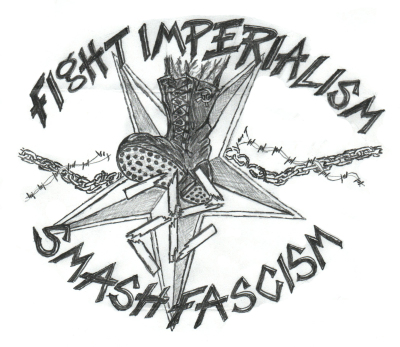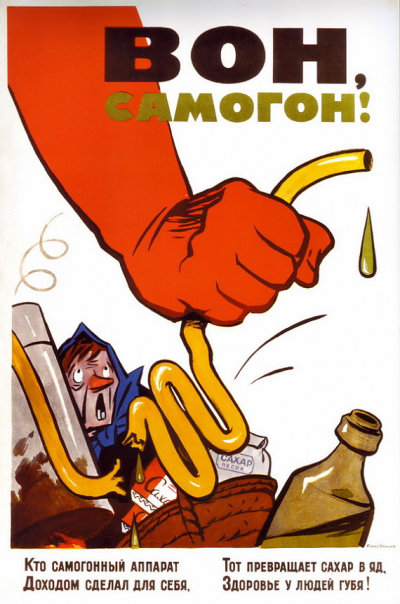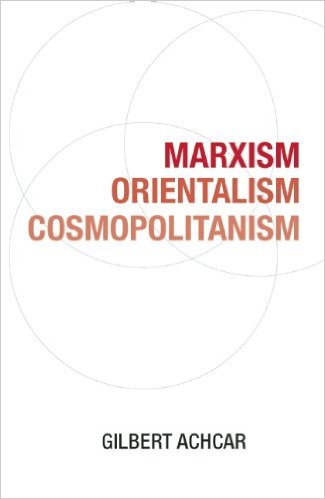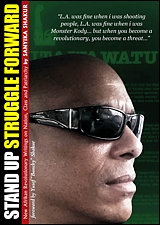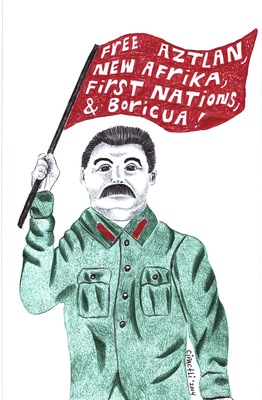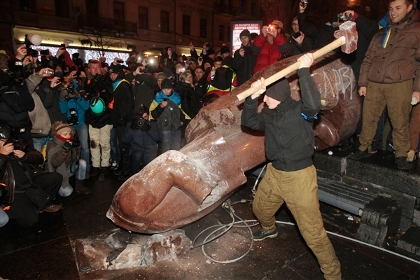
Book Review: Arms & Empire
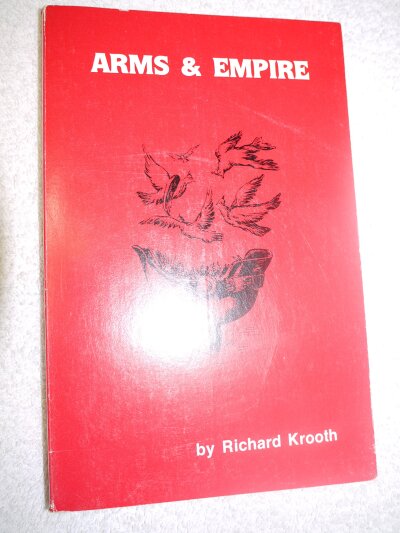
[Arms & Empire(1980) by Richard Krooth is a MIM must read. MIM(Prisons) just developed a study guide to go along with this book. The below is the intro to the study guide with some key quotes from the book.]
Introduction to the study pack
The Maoist Internationalist Movement (originally named the Revolutionary Internationalist Movement) was founded at a time when inter-imperialist conflict between the camp led by the United $tates and that led by the social-imperialist USSR posed a threat to the world. In one of the founding documents, written in 1983, comrades saw the combination of liberation struggles in the Third World and this inter-imperialist conflict as a hotbed for communist revolutions.(1)
MIM founders saw the success of communist revolution as an absolute necessity to prevent a new inter-imperialist war, that would likely lead to nuclear war. As such, they recognized that a revolutionary situation could arise within the United $tates in a matter of years, despite having a budding skepticism of the interests of most in our country in communist revolution.
For most of MIM’s existence now we have not been in the situation described above. By 1991 the “Cold War” was over with the dissolution of the Soviet imperialist bloc. For a solid 3 decades we lived under a “unipolar world”, where U.$. dominated organizations and alliances ruled the world (NATO, World Bank, IMF, etc).
For many years now (in 2022) China has been the rising imperialist power, mostly independent of the U.$.-dominated institutions, though deeply integrated with the U.$. economically. As the contradictions heighten in the U.$.-China economic system, they also heighten in the capitalist system overall. The post-USSR era brought a sacking of the wealth of the former Soviet states by cleptocratic capitalists. This aligned with the capitalist development of China, and the return of exploitative relations dominating over 1 billion people who became the primary producers for consumers in the United $tates and around the world. These processes of wealth extraction were the life-blood for global capitalism for those 3 decades of inter-imperialist peace. But, capitalism must keep expanding, and there is not much more room to expand. Meanwhile, the COVID-19 pandemic triggered a series of collapses in the international system of distribution that prioritized profitability over resiliency.
Earlier this year, Russia invaded Ukraine, in what many fear is the first hot war of what will be an escalating inter-imperialist war. Though to date, it has not yet exceeded in scale the U.$./USSR conflicts of the Cold War. It has brought with it massive trade barriers. The Amerikans have rallied the world to isolate Russia with great success, yet differences in interests have also arisen. This will force many realignments in the coming months and years. The battle for markets, using tariffs and embargoes and currency manipulations, will only escalate. This makes Arms & Empire such a relevant read today.
In 1997, MIM passed a resolution stating:
“For MIM’s purposes, World War III began immediately after World War II ended in 1945. World War III continues today. It is a war between the imperialists and the oppressed nations. By defining World War III as post-World War II, MIM does not mean to say that imperialists did not wage war on the oppressed nations prior to 1945, only that the post-1945 period has specific characteristics (such as: 1. the leading roles of the U.S. and, for a time, the USSR and 2. the predominance of neocolonialism) which separate this period from the pre-1945 periods.”(2)
We can say that world war is inherent to imperialism. As Lenin defined it, imperialism is when the world has been completely divided up by competing monopolist powers, making the export of finance capital the dominant aspect of the economy, and finance capitalists become the shapers of the world. This competition translates to economic and military warfare, both of which result in large numbers of unnecessary humyn deaths. Imperialism kills millions. When warfare between the imperialists can be minimized for a period, the warfare is aimed primarily at the oppressed nations who are resisting the imperialists trying to control and exploit them.
On the eve of World War I, the revisionist Kautsky proposed a theory of ultra-imperialism to supercede imperialism, where the imperialists can ban together to manage the world internationally. Today, there are many bad Marxists who unknowingly promote this metaphysical view of world imperialism where the imperialist forces of NATO and the U.$. are an invincible unbreakable force, and that the best thing the communists can hope for is a counter-balance to U.$. hegemony while tailing other independent imperialists such as Russia or China. While also unknowingly parroting neo-Kautskyism, these revisionist Marxists also unite with the bourgeois Liberals on the world view of a post-Soviet world. The bourgeois liberals had their own theories of “the end of history” after the collapse of the Soviet Union that envisioned the current order to have proven itself as the stable state in which we would remain. In this book, Richard Krooth concisely points out why these fantasies can never come true. The internal contradictions of capitalism and imperialism, brilliantly exposed by Marx and Lenin, translate to antagonistic contradictions among the imperialists that cannot be resolved by synthesis but only by one aspect of that contradiction overtaking the other via warfare. This remains true despite brief periods of relative peace between the imperialists that must also coincide with periods of prosperity and great opportunity for the imperialists. And has MIM has pointed out, even in times of prosperity, the different interests of the labor aristocracy can damper the plans of imperialist unity.(3)
Today, the labor aristocracy is talking about their inability to consume products not made by them in their movement to increased wages, decreased worktimes, etc. However, they seem to be able to consume products not made by them pretty well. Cars, phones, food, etc. are mostly produced by the Third World proletariat, and the main gripe comes with things they don’t own rather than things they don’t produce: rent for example.
As we enter a period of heightened inter-imperialist conflict, we echo the sentiments of MIM’s founders. We are not for war, but we recognize that war by the proletariat to overthrow imperialism is necessary to stop war. As military and economic warfare expands among imperialists and between imperialists and the oppressed nations, opportunities for successful revolutions to put the proletariat in state power increases. This is the solution to war. We aim to destroy imperialism, because imperialism is destroying the planet.
Notes:
1. Manifesto on the International Situation and Revolution (first few pages)
2. Resolution on World War III (1997 MIM Congress)
3. Social-democratic gravy train opposes European Union (2005 MIM Congress)
4. also see: “Ukraine: Imperialism in Crisis” in Under Lock & Key 77 for broad discussion of economic and military warfare against Russia in 2022.
Key summary quotes from book
End of the Introduction:
“For we will see that empire was systemic and competitive; that competition and nationalism then powered the changeover from one system of empire to another; that, consequently, the mercantile colonial system was replaced by a system of free trade with the coming of industrialism; that free trade was thereafter replaced by a return to colonial empires with the rise of monopolization in the leading nations; that war between the Powers resolved little in the fight for world domination; and that a new growth of monopolies led to strengthened colonial spheres of influence and renewed warfare.”
Explanation of the Great Depression (top of p.119):
“The U.S. had long since closed down free trade into America, stopping Germany and other European countries from exporting to American shores to pay their debts. This secured the U.S. dollar for a while, making it the hardest currency in the world, pushing up its value vis-a-vis other currencies, but also making it inaccessible to nations that otherwise would have purchased from America. When other nations could not obtain dollars by exports to the U.S., obviously they could import nothing at all. And so U.S. exports tended to fall and had to be replaced with bilateral trade agreements. Up went U.S. unemployment when markets fell away and bilateral trade could not replace them. Then down came the dollar, the U.S. devaluing in 1933 in an attempt to stimulate the exports again. But, alas, it was too late. The depression was on, production was down, America was spreading crisis to Europe!”
Lead up to WWII (p.129-30):
“Within European nations especially, the road to war was laid out in stages – the first for counterrevolution, the second for capitalist resurgence, and the third for crises and the rise of antagonistic governments seeking to take what all others held in trade, investments, colonies and profits. In the first period (1917-23) we can discern how civilian bands of reactionaries had used force and violence against the agrarian or socialist”revolutions“… The reactionaries demanded”law and order," eventually leading to “counter-revolutions.” Yet the incipient fascist movements did not themselves assume government power, for the marketplace was being re-established and did not require a fascistic state.
"The second period (1924-29) had no use for a fascist government either. The powers of capitalist production were expanding, the market fetters were destroyed, and al the important nations save Great Britain were on the economic upgrade. While the United States enjoyed legendary prosperity and the Continent was doing almost as well, Hitler’s putsch was a footnote in political economy. France evacuated the Ruhr, the Reichsmark was restored by U.S. loans, the Dawes Plan took politics out of reparations, Locarno was in the offing for peace, and Germany was initiating seven fat years. The gold standard ruled from Moscow to Lisbon by the close of 1926; buyers could now pay for their imports, restoring the capitalist marketplace to its full capacity.
"Then came the Great Crash of 1929, the market economy turning down, general economic crisis forcing nations to be sellers but not buyers in the world. The continuing deadlock of market dealings demanded changes in the political way in which economic solutions were planned. The Italian trusts chose fascism as a way out of their economic malaise. The German cartels demanded continental markets and colonies, not by marketplace dealings - for they were shut out of the markets and colonies of the other Powers - but by military conquest. Hitler, their puppet, demanded no more than they asked, Germany taking the lead in totalitarianizng Europe. And with Japan in the Asian wing, the Axis Pact aligned fascist power over five continents.
“Thereby the material conditions of society – monopoly ownership, overproduction, market struggle, political bankruptcy, and military occupation – had ended the marketplace system. The monopolists and cartelists needed fascism to build themselves strong for a military confrontation which, they believed, would award them with more raw materials, more markets, more profits and more power. The liberal business interests, then opting for increasing national competitiveness, also blocked any move towards allowing the social means of production to provide for popular need, instead of their private profit. The fascists, combining jingoism and planned speed-ups for the working population, now displayed a tawdry alternative to the free marketplace. And the monopolists then brought them into power in hopes that their accumulation of private gain would continue undiminished. World War II inexorably followed, not only because leaders willed it, but also because the solutions to economic and political crises required it.”
Related Articles:








